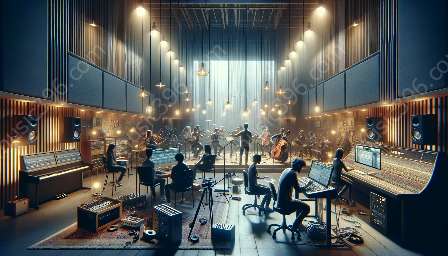When it comes to composing music for large choirs, there are several technical challenges that composers face. These challenges can vary from managing the diverse range of voices to creating effective musical arrangements for a large group. In this topic cluster, we will explore the intricacies of composing for large choirs and how to overcome the technical hurdles that arise in the process.
Understanding the Complexity of Large Choirs
Composing for large choirs presents unique technical challenges due to the sheer number of voices involved. Managing a large group of singers requires a deep understanding of vocal ranges, harmonies, dynamics, and articulation. Composers need to consider the different vocal abilities and strengths of the choir members to create music that is both musically and technically challenging while still being achievable for the performers.
Range and Balance
One of the primary technical challenges of composing for large choirs is ensuring that the vocal ranges are adequately represented and balanced within the music. Composers must consider the distribution of vocal parts across the choir to avoid overburdening specific sections while neglecting others. Balancing the bass, tenor, alto, and soprano voices is crucial for creating a harmonious and well-rounded sound.
Complex Harmonies and Counterpoint
Large choirs offer composers the opportunity to explore complex harmonies and counterpoint, but this also presents a technical challenge. Balancing intricate harmonies and counterpoint across multiple vocal sections requires careful attention to voice leading, texture, and overall musical coherence. Composers need to ensure that each voice part contributes meaningfully to the musical texture while maintaining clarity and balance.
Overcoming Technical Challenges
Despite the technical challenges of composing for large choirs, there are various strategies that composers can employ to overcome these hurdles and create impactful choral music.
Scoring and Orchestration
Effective scoring and orchestration are essential for managing the technical complexities of large choral compositions. Composers must carefully allocate vocal parts, consider voice-leading principles, and orchestrate the accompaniment to support and enhance the choral texture. Utilizing orchestration techniques to highlight different vocal sections and create rich, layered sounds can help address the challenges associated with managing a large number of voices.
Rehearsal Considerations
Composers should take rehearsal considerations into account when addressing technical challenges. Providing clear and detailed vocal parts, rehearsal markings, and performance notes can facilitate the learning and execution of complex choral music. Understanding the capabilities and limitations of choirs, as well as the time and effort required for rehearsal, can inform the compositional approach and help mitigate technical challenges.
Utilizing Technology
Advancements in music technology offer valuable tools for composers to address technical challenges in composing for large choirs. Software for notation, sequencing, and virtual instrumentation can aid in drafting and refining choral compositions, allowing composers to experiment with different arrangements, vocal textures, and harmonies. Additionally, electronic resources can provide rehearsal aids and guidance for performers, helping to streamline the learning process and improve overall performance quality.
Conclusion
Composing for large choirs presents a myriad of technical challenges, from managing vocal ranges and harmonies to orchestrating complex textures. By understanding the intricacies of choral composition and employing effective strategies, composers can overcome these challenges and create compelling works that showcase the beauty and power of large choir music.




























